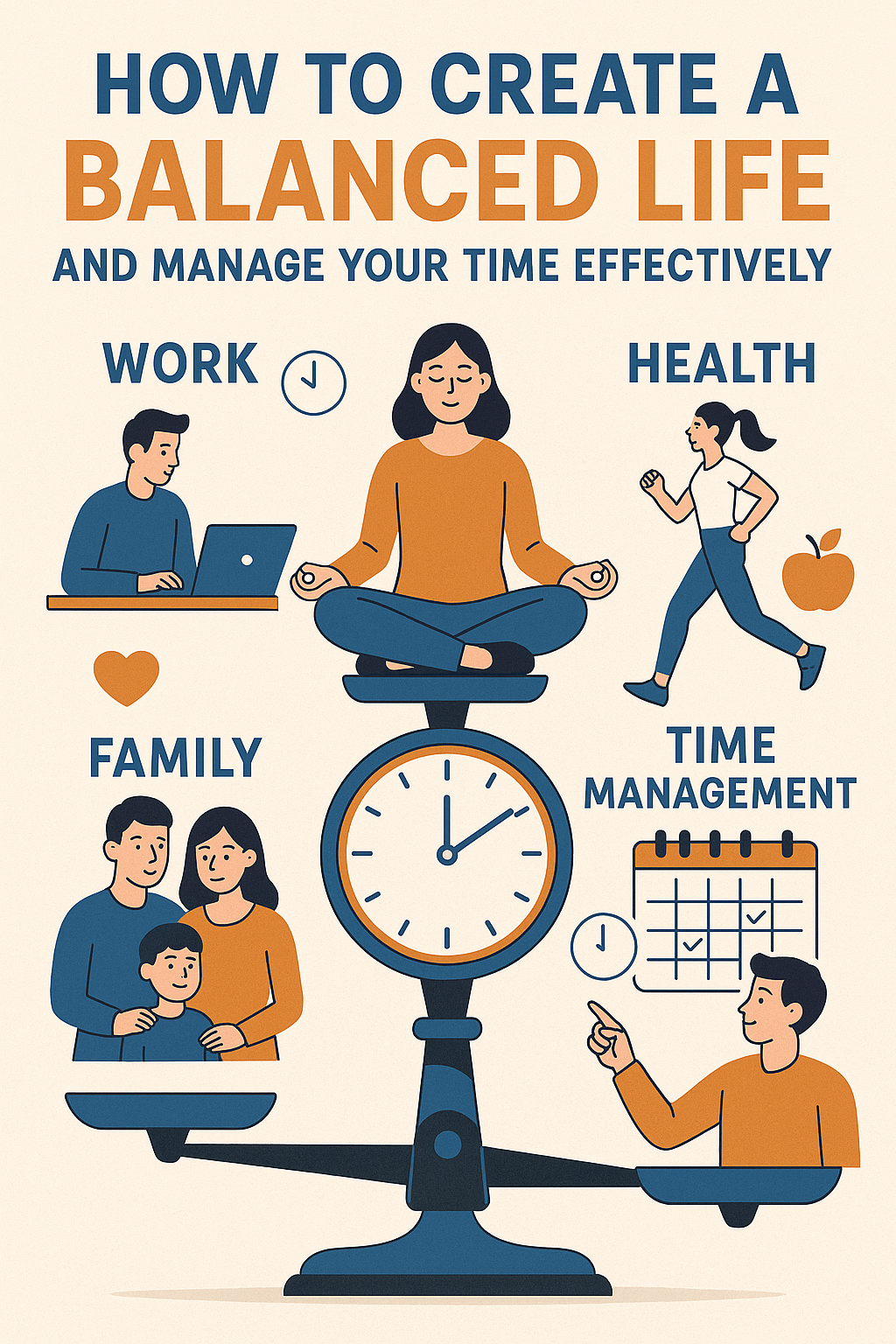In today’s fast-paced world, it can be difficult to balance all of life’s demands, work, family, personal goals, health, and social activities. However, achieving a balanced life and managing your time effectively is crucial for maintaining your well-being, staying productive, and avoiding burnout. In this article, we’ll explore practical tips for creating balance in your life and managing your time in a way that aligns with your priorities.
1. Prioritize What Matters Most
The first step in creating balance in your life is understanding what truly matters to you. When you’re clear on your values and priorities, you can allocate your time and energy accordingly. Without prioritization, it’s easy to get caught up in tasks that aren’t aligned with your goals.
Tip: Take time to reflect on your core values and long-term goals. List your priorities (e.g., health, family, work) and make sure that your actions align with them.
2. Set Clear, Realistic Goals
Setting clear, realistic goals helps you stay focused and organized. Without goals, it’s difficult to know where to direct your time and energy. Setting achievable goals gives you direction and helps you measure progress, which is essential for maintaining balance in your life.
Tip: Use the SMART goal-setting method (Specific, Measurable, Achievable, Relevant, Time-bound) to set clear, actionable goals. Break larger goals into smaller steps to make them more manageable.
3. Create a Structured Daily Schedule
A structured daily schedule is a powerful tool for managing your time effectively. By setting aside specific times for tasks and activities, you can ensure that you’re using your time wisely and not over-committing yourself.
Tip: Plan your day the night before, making sure to include time for both work and personal activities. Be realistic about how much you can accomplish, and don’t forget to schedule breaks.
4. Learn to Say No
One of the most important skills for achieving balance is learning how to say no. Over-committing yourself to activities, responsibilities, or requests can quickly lead to stress and overwhelm. Saying no to things that don’t align with your priorities allows you to focus on what really matters.
Tip: Practice setting boundaries and be confident in saying no when necessary. It’s okay to decline invitations or requests that don’t fit within your schedule or goals.
5. Delegate Tasks
If you’re trying to do everything yourself, you’re likely to burn out. Delegating tasks, whether at work or at home, can free up your time and help you focus on what’s most important. Don’t be afraid to ask for help or delegate tasks to others.
Tip: Identify tasks that can be delegated to others, and trust them to handle them. This will not only reduce your stress but also help you build stronger teamwork and support systems.
6. Take Regular Breaks
It’s easy to get caught up in work or personal tasks, but taking regular breaks is essential for maintaining focus and productivity. Breaks help refresh your mind, reduce stress, and improve your overall well-being.
Tip: Follow techniques like the Pomodoro method to work in focused intervals, followed by short breaks. Use your break time to stretch, take a walk, or engage in a quick relaxation exercise to recharge.
7. Incorporate Time for Self-Care
Self-care is vital for maintaining a healthy balance in your life. When you prioritize your well-being, physically, mentally, and emotionally, you’re better equipped to manage your responsibilities and handle stress. Make time for activities that help you relax and recharge.
Tip: Schedule self-care activities into your day, such as exercise, meditation, reading, or spending time with loved ones. Even small moments of self-care can have a big impact on your overall balance.
8. Avoid Multitasking
Multitasking may seem like a way to get more done, but it often leads to mistakes, distractions, and burnout. Focusing on one task at a time allows you to be more productive, present, and efficient. It also helps you manage your time more effectively by keeping your attention on the task at hand.
Tip: Commit to focusing on one task at a time, and avoid switching between tasks. This will improve your productivity and help you feel more accomplished at the end of the day.
9. Reflect and Adjust Regularly
Creating balance in your life isn’t a one-time task, it’s an ongoing process. Regularly reflect on how you’re spending your time and whether it’s aligned with your priorities. If something isn’t working or you feel out of balance, make adjustments to your schedule or goals.
Tip: Set aside time each week to reflect on your progress and identify areas where you can improve. Make small adjustments to your routine or goals to maintain balance and continue working toward your objectives.
10. Be Flexible and Adapt to Change
Life is unpredictable, and sometimes things won’t go as planned. Flexibility is key to maintaining balance, as it allows you to adapt to changes and manage unexpected challenges. Rather than stressing over setbacks, embrace them as opportunities to learn and grow.
Tip: When things don’t go as planned, take a deep breath and adjust your approach. Stay flexible and remind yourself that balance doesn’t mean perfection, it means adapting to what life brings.
